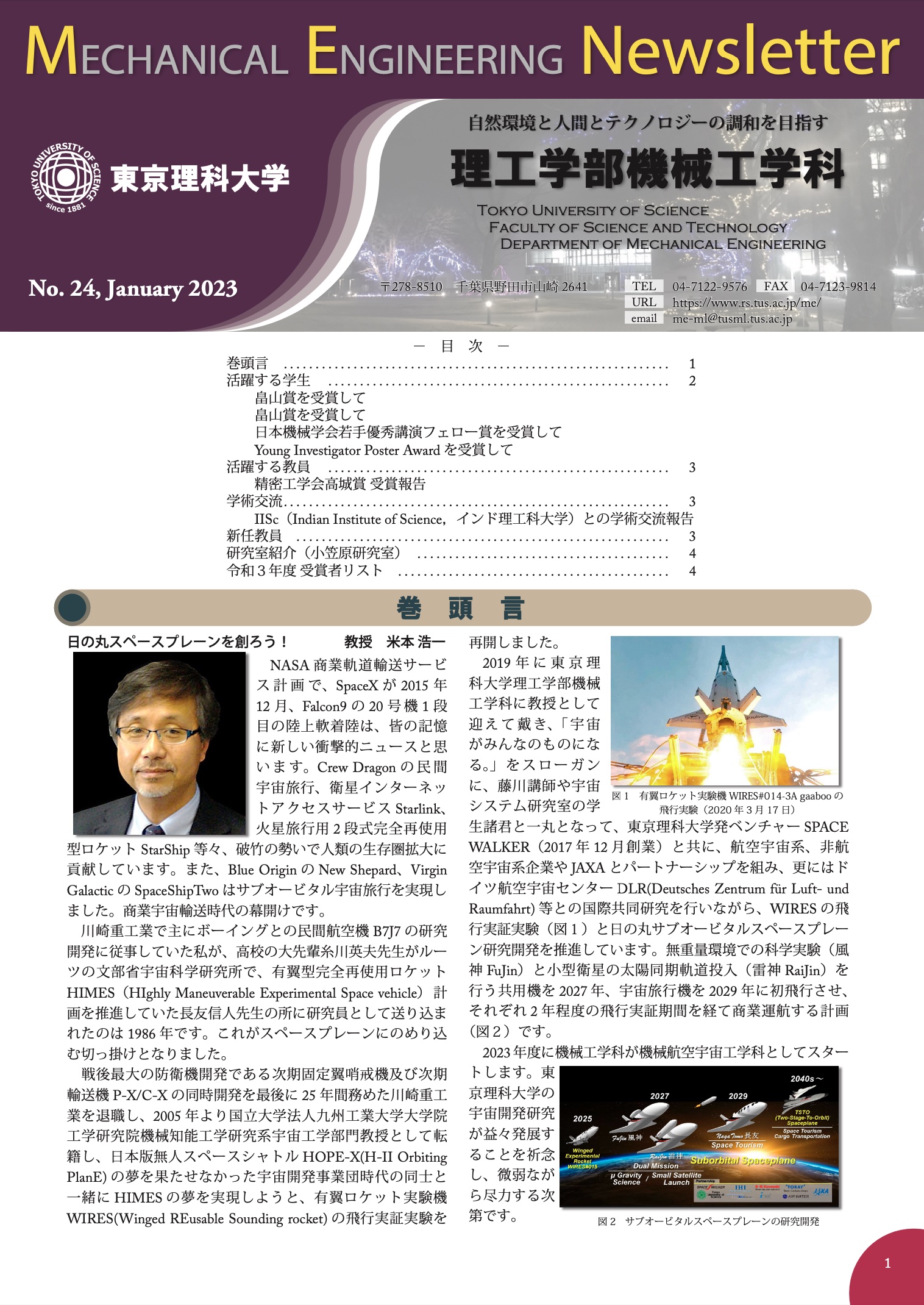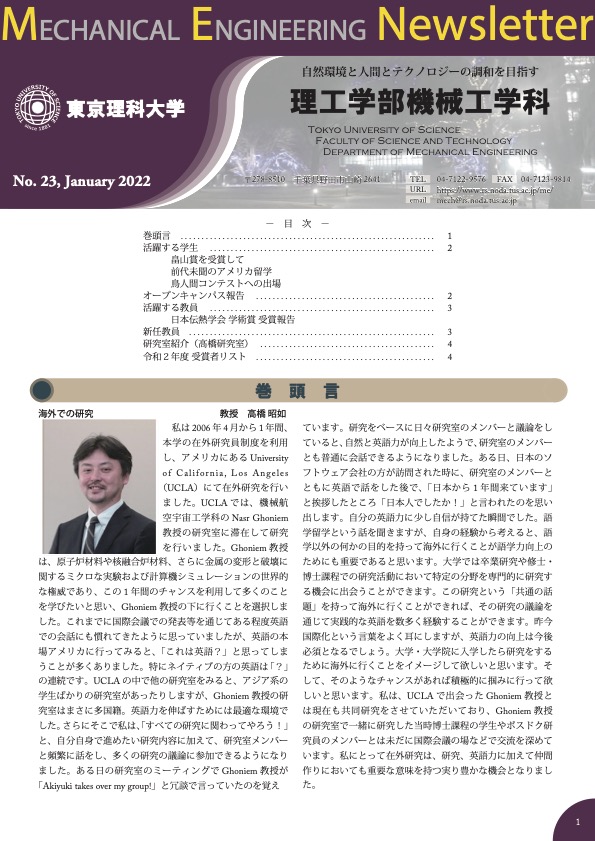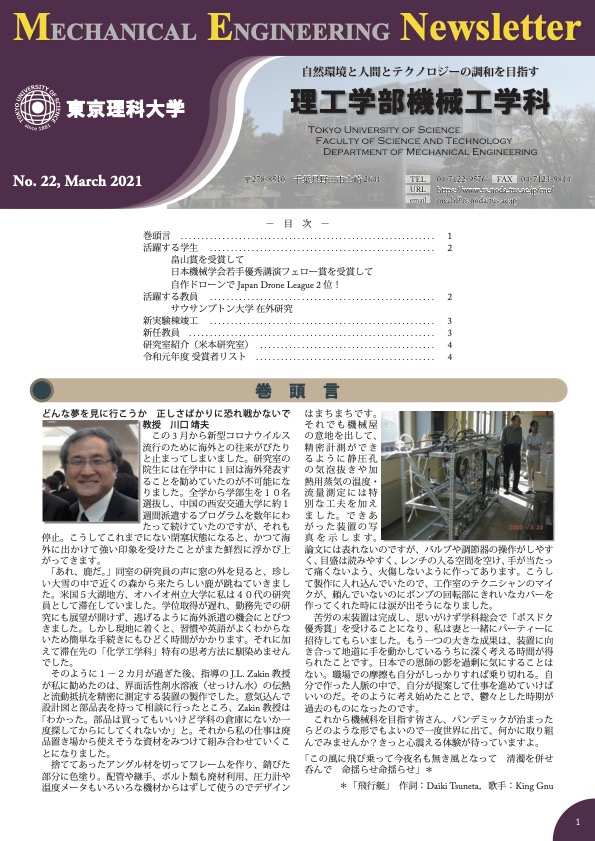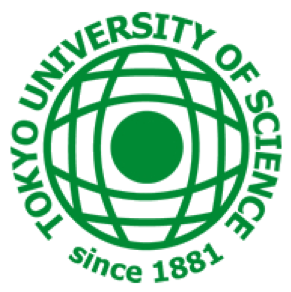
Department of Mechanical and Aerospace Engineering
Faculty of Science and Technology
Department overview
 |
Research areas
Mechanical Engineering is a discipline that supports the overall science and technology. There are a wide array of research themes that the discipline encompasses, such as heat and fluid phenomenon in the cosmic environment, microfluid mechanics, spaceplane materials, materials fracture mechanics, mechanical processing and nano technology, automated control and robot, as well as pollution minimum combustion, etc.
|
|
Department characteristics
Human beings live under the influence of the natural environment, the cosmic environment, and the advanced technologies created by man him self. Mechanical Engineering, as an academic discipline, possesses an intimate relationship not only with humans, but also environments. Research studies conducted at the laboratories of the Department of Mechanical Engineering embrace a large variety of aspects; capabilities cultivated at the Department provide expertise found useful in any realm of the business community.
|

|
 |
Stages of learning
It is crucial for students of Mechanical Engineering to possess a broad rage of knowledge and experience, as well as cultivate a deep understanding of the natural environment. With the motto of the harmonization of the natural environment, human race, and technology in mind, the Department of Mechanical Engineering provides education and research opportunities that help foster engineers and researchers to resiliently respond to future needs including even those affecting cosmic environments. With the support of top-flight internationally renowned faculty members, students are able to acquire education in a setting abundant with nature. Students take courses in fundamental mechanical engineering, mechanical engineering experiment, computer exercise, mechanical design, technical drawing, etc. by the third year. Thereafter, in the fourth year, each student selects his choice of laboratory. Graduation work is done in small group settings, under the direct guidance of an instructor, and offers various research themes, making the best of the unique quality of Mechanical Engineering that encompasses links with the most advanced scientific study of numerous fields.
|
After graduation
 |
 |
|
Graduate school
Graduate school of Tokyo University of Science: Approx. 60
Schools of other universities: Approx. 10 |
Carrier
Toyota, Honda, Nissan, Mitsubishi Heavy Industries, IHI, Toshiba, Hitachi, JR, Sony, Cannon, JAXA to name a few
(There are a few times more employment offers than our enrollment limit each year) |
News
| October 19, 2023 | Staff page was updated. |
| January 18, 2023 | Newsletter(No.24) was published. |
| January 21, 2022 | Newsletter(No.23) was published. |
| April 1, 2021 | Staff page was updated. |
| January 29, 2021 | Newsletter(No.22) was published. |
| June 9, 2020 | Staff page was updated. |
| February 26, 2019 | Newsletter(No.19) was published. |
| April 6, 2018 | Staff page was updated. |
| April 1, 2017 | Staff page was updated. |
| April 26, 2016 | Website was fully renewed. |
Staff
Professor





Akiyuki TAKAHASHI
Area of expertise: Computational mechanics, Materials mechanics, Materials strength

Area of expertise: Computational mechanics, Materials mechanics, Materials strength






Associate professor



Jr. Associate professor

Takahiro FUJIKAWA
Area of expertise: Aerospace engineering, Reusable space transportation system, Optimization

Area of expertise: Aerospace engineering, Reusable space transportation system, Optimization

Assistant professor





Laboratory
Laboratories of applied mechanics
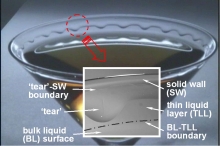
Ueno laboratory
Staff: Ichiro UENO
Area of expertise: Thermofluid dynamics, Heat-transfer engineering
Staff: Ichiro UENO
Area of expertise: Thermofluid dynamics, Heat-transfer engineering

Okada laboratory
Staff: Hiroshi OKADA,Yuto OTOGURO
Area of expertise: Computational fracture mechanics, Computational bio-mechanics
Staff: Hiroshi OKADA,Yuto OTOGURO
Area of expertise: Computational fracture mechanics, Computational bio-mechanics

Takahashi laboratory
Staff: Akiyuki TAKAHASHI, Atsuo HIRANO
Area of expertise: Computational mechanics, Materials science, Materials strength
Staff: Akiyuki TAKAHASHI, Atsuo HIRANO
Area of expertise: Computational mechanics, Materials science, Materials strength

Tsukahara laboratory
Staff: Takahiro TSUKAHARA, Ryo ARAKI
Area of expertise: Computational fluid dynamics, Heat-transfer engineering, Turbulence dynamics
Staff: Takahiro TSUKAHARA, Ryo ARAKI
Area of expertise: Computational fluid dynamics, Heat-transfer engineering, Turbulence dynamics

Matsuzaki laboratory
Staff: Ryosuke MATSUZAKI
Area of expertise: Composite materials, Smart materials and structures
Staff: Ryosuke MATSUZAKI
Area of expertise: Composite materials, Smart materials and structures

Asakura laboratory
Staff: Takumi ASAKURA
Area of expertise: Vibration engineering, Applied acoustics, Architectural acoustics
Staff: Takumi ASAKURA
Area of expertise: Vibration engineering, Applied acoustics, Architectural acoustics

Laboratories of mechano-informatics

Takemura laboratory
Staff: Hiroshi TAKEMURA,Masataka YAMAMOTO
Area of expertise: Biomechatronics, Robotics, Human modeling, Mechatronics
Staff: Hiroshi TAKEMURA,Masataka YAMAMOTO
Area of expertise: Biomechatronics, Robotics, Human modeling, Mechatronics

Noguchi laboratory
Staff: Shoji NOGUCHI
Area of expertise: Rolling bearing engineering, Tribology, Machine elements, Fine measuring
Staff: Shoji NOGUCHI
Area of expertise: Rolling bearing engineering, Tribology, Machine elements, Fine measuring


Laboratories of aerospace engineering

Ogasawara laboratory
Staff: Ko OGASAWARA
Area of expertise: Aerospace engineering, High speed aerodynamics
Staff: Ko OGASAWARA
Area of expertise: Aerospace engineering, High speed aerodynamics

Ogihara laboratory
Staff: Shinji OGIHARA, Mohammad Fikry
Area of expertise: Composite materials, Mechanical materials
Staff: Shinji OGIHARA, Mohammad Fikry
Area of expertise: Composite materials, Mechanical materials


















